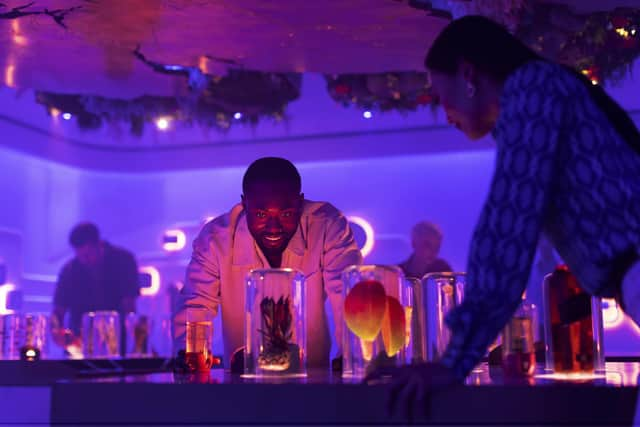Exclusive:Artificial Intelligence: How AI is being used in the whisky industry - and what this could mean for the future
In 2019 Swedish whisky distillery Mackmyra, in association with Microsoft, created the world’s first artificial intelligence (AI) generated whisky. Named Intelligens, it was made using analysis from more than 70 million different combinations of whiskies based on Mackmyra’s original 75 recipes.
While it made headlines at the time, it didn’t really penetrate the consumer zeitgeist. But now, with advancements in AI coming on in leaps and bounds and many of us using programmes like ChatGPT, AI is hitting the headlines and the mainstream. But what does this mean for the whisky industry?
Advertisement
Hide AdAdvertisement
Hide AdWhisky is a historical drink, synonymous with Scotland, storytelling and people. It’s a handcrafted spirit and is marketed as such, through its history, locations and characters that create it. So much of what makes up the Scotch whisky identity is reliant on people, so how can AI fit into this? As things stand, AI is mainly being used to personalise the whiskies you pick – although it can be used to find patterns in vast datasets to generate recommendations for new combinations and new flavours, as Mackmyra have done. Experts say it should be seen as a tool to help rather than something to be feared.


Edinburgh University professor of data arts and society Drew Hemment leads and directs the New Real – a joint project involving the Alan Turing Institute, which is the UK national AI Institute. He highlighted some misinformation about AI, saying: “AI is a transformative technology that is already having huge impacts and that will continue. But some of what we hear is overblown and is a misrepresentation. For example, we do not need to worry about robots marching down the street to destroy us. AI is a technology created by humans that has some capabilities for autonomy. But AI does not have intent, either good or bad.”
One of the whisky companies using AI is Diageo, which have used it to create their Flavour Finder quiz, which visitors to their Johnnie Walker Experience on Princes Street take before the Journey of Flavour tour. This quiz asks a short series of questions around flavours, which are ranked by guests on a sliding scale. AI then assigns them a flavour profile based around the flavour wheel – smoky, spicy, fruity, tropical, creamy and fresh – which then informs the drinks they will be served during their experience.
Rob Maxwell, head of Johnnie Walker Princes Street, said: “The Flavour Finder has been a huge help in breaking down preconceptions around Scotch whisky, which is a core part of our mission at Johnnie Walker Princes Street, where 56 per cent of our guests do not consider themselves regular Scotch drinkers.” Mr Maxwell stressed AI should be seen as a tool, saying: “In our experience AI is best used in conjunction with human skills and, crucially, personalities. On the Journey of Flavour experience, for example, while AI helps our guests understand their personal flavour profile, it’s the charm, knowledge and passion of our experience ambassadors and wider team who bring the Journey of Flavour to life, answer questions, give recommendations on cocktails to try at home, bottles to consider in our retail store and much more besides, that makes their time with us truly memorable.”
This ability of AI to tailor choice for consumers, or visitors to experiences like Johnnie Walker Princes Street, ties in with an analogy Prof Hemment uses. He said “AI can be seen as the Netflix for whisky”, referring to how recommendations on streaming platforms, including Spotify, recommend other programmes and music for users based on AI. “There’s an idea that you could log into a website and it already knows your purchasing history, and you can maybe answer a few questions, and it is going to recommend to you some whiskies that are really suited to you that are personalised – like a personalised whisky service,” he said.


A company using AI as a tool for this kind of granular personalisation is Preferabli, co-founded by Pam Dillon and Andrew Sussman. They have been working with Masters of Wine and Master Sommeliers for ten years, and have recently turned their attention to whisky. What makes Preferabli different from other businesses, as Ms Dillon explains, is that large sites such as Amazon use collaborative filtering, which is a bit like a popularity contest.
“Here are a bunch of people that liked a given product, and here are another bunch of people that liked that product,” she said. “And if the first one likes a new product, then somehow a new person in the second group is supposed to like it.” Ms Dillon said this can make sense for material goods, such as shower curtains, but doesn’t work for sensory consumer products such as wine and spirits. Preferbali, she claimed, is the only platform in the world that is using true machine learning and true artificial intelligence.
“We have developed our own database where our Masters of Wine, Master Sommeliers and other experts, such whisky experts, taste and evaluate – one at a time, vintage by vintage for wine, released by release for whisky – each, for the presence and the absence of anywhere between 500 and 800 characteristics depending upon how sophisticated the product is,” she said. “The nature of all of those characteristics is not only reflected in our database, it's what our algorithms use, in order to build an individual preference profile for each user.”
Advertisement
Hide AdAdvertisement
Hide AdIn basic terms, they have built software to work like a human expert – in this case an expert on wines and on whiskies – at scale. But what does this mean for the consumer and the industry?


Ms Dillon said both had the same problem to be solved – that of too much choice. “Having too much choice is overwhelming, but code can, whatever situation the consumer is in, take the field of the possible and bring it down into the field of the preferred, or what's going to be preferred – and that’s what Preferabli is doing with drinks, including whisky,” she said. For businesses, they too can use this technology to hone in on customers who they know are going to love their products Ms Dillon said: “This is truly AI for for the better, the best possible outcome for the world. And I would love to see a world where young producers, new producers are coming to market knowing that what they're making will find a consumer.”
One of Preferabli’s whisky experts, Colin Hampden-White said this AI software was a “game-changer” for consumers and businesses. He said: “The ability to have bespoke recommendations for one's personal palate is truly ground-breaking.”
It might be a bit mind-bending for some, but the developments of AI are pointing towards a slicker, more personalised experience, where a person’s next favourite whisky is just a click away.
Comments
Want to join the conversation? Please or to comment on this article.